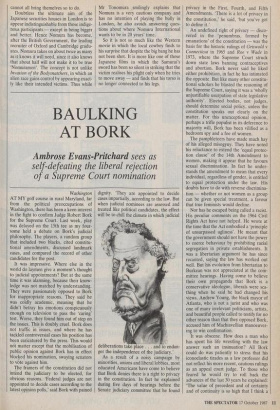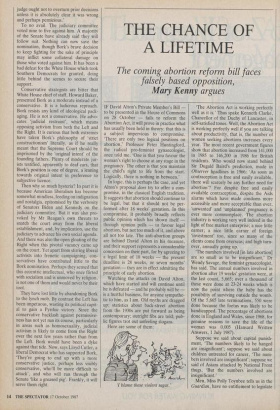BAULKING AT BORK
Ambrose Evans-Pritchard sees as
self-defeating the liberal rejection of a Supreme Court nomination
Washington AT MY golf course in rural Maryland, far from the political preoccupations of Washington, there has been a keen interest in the fight to confirm Judge Robert Bork for the Supreme Court. Last week, play was delayed on the 15th tee as my four- some held a debate on Bork's judicial philosophy. The players, a random group that included two blacks, cited constitu- tional amendments, discussed landmark cases, and compared the record of other candidates for the post.
It was impressive. Where else in the world do laymen give a moment's thought to judicial appointments? But at the same time it was alarming, because their know- ledge was not matched by understanding. They were passionately opposed to Bork for inappropriate reasons. They said he was coldly academic, meaning that he didn't betray his emotions conspicuously enough on television to pass the 'caring' test. Worse, they found him out of step on the issues. This is doubly cruel. Bork does not traffic in issues, and where he has tackled controversial cases his position has been caricatured by the press. This would not matter except that the mobilisation of public opinion against Bork has in effect blocked his nomination, swaying senators to vote against him.
The framers of the constitution did not intend the judiciary to be elected, for obvious reasons. 'Federal judges are not appointed to decide cases according to the latest opinion polls,' said Bork with pained dignity. 'They are appointed to decide cases impartially, according to the law. But when judicial nominees are assessed and treated like political candidates, the effect will be to chill the climate in which judicial deliberations take place . . . and to endan- ger the independence of the judiciary.' As a result of a noisy campaign by minorities, unions and liberal lobbies, most educated Americans have come to believe that Bork denies there is a right to privacy in the constitution. In fact he explained during five days of hearings before the Senate judiciary committee that he found privacy in the First, Fourth, and Fifth Amendments. 'There is a lot of privacy in the constitution,' he said, tut you've got to define it.'
An undefined right of privacy — disco- vered in the 'penumbras, formed by emanations' of the constitution — was the basis for the historic rulings of Griswold v Connecticut in 1965 and Roe v Wade in 1973, where the Supreme Court struck down state laws banning contraceptives and abortion. Bork never said he liked either prohibition, in fact he has intimated the opposite. But like many other constitu- tional scholars he blasted the reasoning of the Supreme Court, saying it was a 'wholly unjustifiable usurpation of state legislative authority'. Elected bodies, not judges, should determine social policy, unless the constitution speaks out clearly on the matter. For this unexceptional opinion, perhaps a trifle populist in its deference to majority will, Bork has been vilified as a bedroom spy and a foe of women.
The pamphleteers have made much hay of his alleged misogyny. They have noted his reluctance to extend the 'equal protec- tion clause' of the 14th Amendment to women, making it appear that he favours sexual discrimination. In fact he under- stands the amendment to mean that every individual, regardless of gender, is entitled to equal protection under the law. His doubts have to do with reverse discrimina- tion — whether or not women as a group can be given special treatment, a favour that true feminists would decline.
Nor has he escaped being called a racist. His peculiar comments on the 1964 Civil Rights Act have not helped. He wrote at the time that the Act embodied a 'principle of unsurpassed ugliness'. He meant that the government should not have the power to coerce behaviour by prohibiting racial segregation in private establishments. It was a libertarian argument he has since recanted, saying the law has worked out well. But his evolution from libertarian to Burkean was not appreciated at the com- mittee hearings. Having come to believe their own propaganda that Bork is a conservative ideologue, liberals were sca- thing when he said he had changed his views. Andrew Young, the black mayor of Atlanta, who is not a jurist and who was one of many irrelevant politicians, artists, and beautiful people called to testify for no other reason than that they opposed Bork, accused him of Machiavellian manoeuver- ing to win confirmation. It was obscene. How does a man who has spent his life wrestling with the law answer such an insinuation? All Bork could do was patiently to stress that his iconoclastic tirades as a law professor did not reflect his more recent, cautious rulings as an appeal court judge. To those who feared he would try to roll back the advances of the last 30 years he explained: 'The value of precedent and of certainty and of continuity is so high that I think a judge ought not to overturn prior decisions unless it is absolutely clear it was wrong and perhaps pernicious.'
To no avail. The judiciary committee voted nine to five against him. A majority of the Senate have already said they will follow suit. Nothing can now save the nomination, though Bork's brave decision to keep fighting for the sake of principle may inflict some collateral damage on those who voted against him. It has been a bad defeat for the White House which took Southern Democrats for granted, doing little behind the scenes to secure their support.
Conservative strategists are bitter that White House chief of staff, Howard Baker, presented Bork as a moderate instead of a conservative. It is a ludicrous reproach. Bork resists any kind of ideological pack- aging. He is not a conservative. He advo- cates 'judicial restraint', which means opposing activism from both the Left and the Right. It is curious that both extremes have taken Bork's philosophy of 'strict constructionism' literally, as if he really meant that the Supreme Court should be imprisoned by the 'original intent' of the founding fathers. Plenty of moderate jur- ists testified, apparently to deaf ears, that Bork's position is one of degree, a leaning towards original intent in preference to suNective licence.
Then why so much hysteria? In part it is because American liberalism has become somewhat mindless, feeding on indignation and nostalgia, epitomised by the verbosity of Senators Biden and Kennedy on the judiciary committee. But it was also pro- voked by Mr Reagan's own threats to snatch the court away from the liberal establishment, and, by implication, use the judiciary to advance his own social agenda. And there was also the open gloating of the Right when this pivotal vacancy came up on the court. Yet apart from stirring liberal activists into frenetic campaigning, con- servatives have contributed little to the Bork nomination. Perhaps they sensed that this eccentric intellectual, who once flirted with socialism and is unmoved by religion, is not one of them and would never be their tool.
They have lost little by abandoning Bork to the lynch mob. By contrast the Left has been impetuous, wasting its political capit- al to gain a Pyrrhic victory. Since the conservative backlash against permissive- ness has not yet run its course, particularly in areas such as homosexuality, judicial activism is likely to come from the Right over the next few years rather than from the Left. Bork would have been a dyke against that tide. Now, says Lloyd Cutler, a liberal Democrat who has supported Bork, 'They're going to end up with a more conservative justice, perhaps less visibly conservative, who'll be more difficult to attack', and who will run through the Senate `like a greased pig'. Frankly, it will serve them right.



























































 Previous page
Previous page